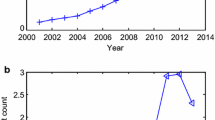Abstract
Regional innovation system (RIS) is the new research field of modern economic geography in the age of knowledge economy. Based on the researches of regional economic geography, the authors of the paper consider RIS as the integrated and interactive systems with innovation milieu, elements, units, structure and functions. Five aspects of evaluation indicators including innovation input scale and output scale, innovation milieu transition, innovation inner operation, as well as innovation outer impact are worked out for final indicators of RIS scale and quality. According to different RIS situations, three patterns of independent, imitative and cooperative development are put forward for choosing. At the latter part of the paper, we select 12 provincial regions (including three municipalities and one autonomous region) of China for empirical study. The results show that there exists great difference among each region from the aspects of innovation scale and quality mainly owning to the diversification of RIS social and economic milieu, the major innovative units of enterprises, universities and R&D institutes. Finally, the paper points out the innovation development decisions for each region.
Similar content being viewed by others
References
CHEN Cai, 2001. Regional Economic Geography [M]. Beijing: Science Press, 118–179. (in Chinese)
CHEN Cai, LIU Shu-guang, 1998a. Construction of theoretical system of regional economic geography in the 21st century in China[J]. Scientia Geographica Sinica, 18(5): 393–400. (in Chinese)
CHEN Cai, LIU Shu-guang, 1998b. A retrospect and prospect on the development of regional economic geography [J]. Progress in Geography, 17(3): 1–10. (in Chinese)
CHEN Cai, LIU Shu-guang, 1999. An initial approach to the construction of methodology in regional economic geography[J]. Geographical Research, 18(1): 1–6. (in Chinese)
Chinese Academy of Sciences, 2001. High Technology Development Report of China[M]. Beijing: Science Press, 155–163. (in Chinese)
Chinese Ministry of Science and Technology, 1998. China Science and Technology Indicators [M]. Beijing: Social Science Document Press, 171–222. (in Chinese)
COOKE P, BRACZYK H J, HEIDENREICH M (eds.), 1996. Regional Innovation Systems: the Role of Governances in the Globalized World [M]. London: UCL Press, 1–16.
FREEMAN C, 1987. Technology Policy and Economic Performance: Lessons from Japan[M]. London: Pinter.
LIU Shu-guang, 2002. An initial approach to future development of regional economic geography in China[J]. Area Research and Development, 21(2): 1–4. (in Chinese)
LIU Shu-guang, CHEN Cai, 1998. Construction of regional economic geography: a study on conditions and elements of economic region[J]. World Regional Studies, 7(2): 1–7. (in Chinese)
LIU Shu-guang, CHEN Cai, 1999. Progress of regional economic geography in China: a comparative study [J]. The Journal of Chinese Geography, 8(3): 257–263.
LIU Shu-guang, TIAN Li-qin, 2001. Regional development through innovation: models and international cases[J]. World Regional Studies, 10(1): 20–23. (in Chinese)
LIU Shu-guang, XU Shu-jian, 2002. Progress of regional innovation system studies: an international perspective[J]. China Science and Technology Forum, 11(5): 33–37. (in Chinese)
LUNDVALL B A (ed.), 1992. National Innovation System: Towards a Theory of Innovation and Interactive Learning [M]. London: Pinter.
The Research Group of China Scientific & Technological Development Strategy, 1999. The Report of China Scientific & Technological Development[M]. Beijing: Economy and Management Press, 140. (in Chinese)
The Research Group of China Scientific & Technological Development Strategy, 2000. The Report of China Scientific & Technological Development[M]. Beijing: Social Science Document Press, 152–175. (in Chinese)
The Research Group of China Scientific & Technological Development Strategy, 2001. The Report of Regional Innovation Capacity of China[M]. Beijing: The Press of Party Members’ Training School of the Chinese Communist Party Central Committee, 567–683. (in Chinese)
The Research Group of Sustainable Development of Chinese Academy of Sciences, 1999. 1999 Report of Sustainable Development of China[M]. Beijing: Science Press, 295–372. (in Chinese)
WANG Ji-ci, 1998. In search of innovativeness: the case of Zhongguancun[A]. In: MALECKI E, OINA P (eds.), Making Connections: Technological Learning and Regional Economic Change[C]. Aldershot: Ashgate, 205–220.
WANG Jian, 1998. Regions and Development[M]. Hangzhou: Zhejiang People’s Press, 281. (in Chinese)
WIIG H, WOOD M, 1999. What comprises a regional innovation system?[R]. http://web.sol.no/step.
Author information
Authors and Affiliations
Additional information
Foundation item: Under the auspices of the National Natural Science Foundation of China (No. 40131010)
LIU Shu-guang (1966–), male, a native of Xiajin County of Shandong, Ph. D., associate professor, specialized in regional economic development and regional innovation system. E-mail: dawnliu9631@263.net
Rights and permissions
About this article
Cite this article
Liu, Sg., Chen, C. Regional innovation system: Theoretical approach and empirical study of China. Chin. Geograph.Sc. 13, 193–198 (2003). https://doi.org/10.1007/s11769-003-0016-5
Received:
Issue Date:
DOI: https://doi.org/10.1007/s11769-003-0016-5




